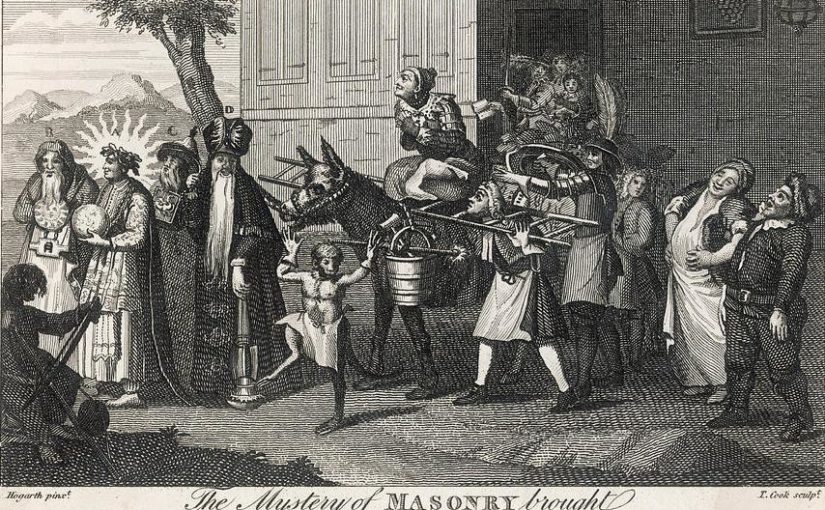The growing popularity of the idea of ‘observant’ Masonry has found brethren in all corners of the Craft asking the question of what exactly an observant Lodge is, and how they might go about increasing Masonic observance in their own Lodges. This document offers eight basic measures which, if observed, should result in the development of an observant Lodge. Each of these steps is either entirely consistent with Anderson’s Constitutions of the FreeMasons [the foundational document of the Premier Grand Lodge, published in 1723 and hereafter simply referred to as the Book of Constitutions], or historical Masonic practice in North America, or both. Nothing proposed in them is alien to our Grand Lodges or their respective histories. The success or failure of these steps is entirely up to the brethren of each Lodge. First, however, it might be helpful to offer an answer to the primary question: what exactly does one mean by ‘observant’? Simply put, observant Masonry means observing the intent of the founders of speculative Masonry. That intent was not to build a mere social club or service organisation. While the Craft—like any other human organisation—has always been burdened by men in its ranks who subverted the purposes of the fraternity to a more mundane or profane enterprise, that was never the intent of the institution. That intent was to build an institution that calls men to their highest level of social being, in a state of dignity and decorum, which could serve as a place for serious, mindful discourse on the lessons and meaning of life, and search for the better development of oneself. That intent means building a space where such an experience can be created, and carrying ourselves in a manner that is consistent with our highest ideals and noblest behaviours. Observant Masons believe that by observing what the history of our Craft tells us in regard to that intent, we will find the optimal Masonic experience. We say observant, and speak of observance, because we seek to observe the blueprints of that intent to the best of our knowledge and ability. Even more simply, we want to do things right, and we don’t want to settle for less. We want to pursue excellence in all aspects of our Masonic labour. The eight steps offered here have proven to be successful in greatly increasing the experience of Freemasonry for brethren new and old alike. They serve as a quality control system for the operation of any Lodge, and when followed, result in a group of men who, regardless of the number of members in their Lodge, or the external nature of their temple, can find a sense of accomplishment and pride in what they have done, and who they have become. That too, is consistent with the intent of our founders.
1
Guarding the West Gate
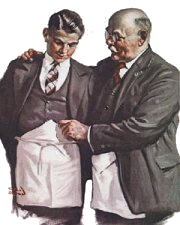 This point is first among these, because we are nothing more or less than who we let in to our Fraternity. Not every man should be a Mason, and not every man who should be a Mason belongs in just any Lodge. The brethren have a right and responsibility to determine the standards for their own Lodge, and to ask incisive questions of those men who knock on their door. Lodges should take time to first get to know the men who knock at their doors, and not simply sign any petition just because a man has an interest. Brothers who sign a petition for a man need to know who they are signing for, and more important, need to be willing to serve as his mentor. This is a fundamental point of responsibility for all brethren. Do not ask a brother in your Lodge to do the job of mentoring for you. If you are not willing to give that petitioner your time, how can you ask your Lodge to give theirs?
This point is first among these, because we are nothing more or less than who we let in to our Fraternity. Not every man should be a Mason, and not every man who should be a Mason belongs in just any Lodge. The brethren have a right and responsibility to determine the standards for their own Lodge, and to ask incisive questions of those men who knock on their door. Lodges should take time to first get to know the men who knock at their doors, and not simply sign any petition just because a man has an interest. Brothers who sign a petition for a man need to know who they are signing for, and more important, need to be willing to serve as his mentor. This is a fundamental point of responsibility for all brethren. Do not ask a brother in your Lodge to do the job of mentoring for you. If you are not willing to give that petitioner your time, how can you ask your Lodge to give theirs?
2
Being Proficient in Masonic Ritual and Law
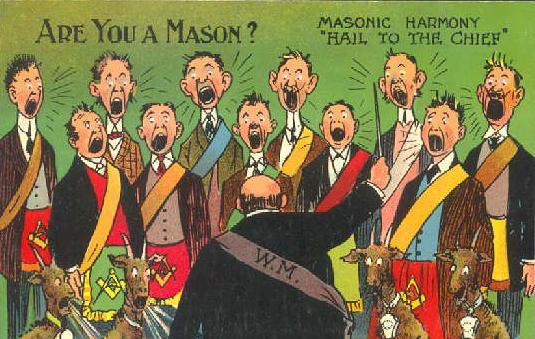 Proficiency is an essential function of any observant Lodge, because we must know both what we are doing, and why, if we seek to uphold the highest standards of our respective Grand Lodges. It does no good to claim the mantle of excellence if your Lodge is not well-versed in the ritual and the Masonic law of your jurisdiction. Masonry is a thing of order, not anarchy. If you wish to keep that order, as well as harmony between your Lodge and the Grand Lodge, you must learn and follow the rules that each brother has obligated himself to observe. An observant Lodge is not a renegade Lodge. It seeks to be an exemplary one.
Proficiency is an essential function of any observant Lodge, because we must know both what we are doing, and why, if we seek to uphold the highest standards of our respective Grand Lodges. It does no good to claim the mantle of excellence if your Lodge is not well-versed in the ritual and the Masonic law of your jurisdiction. Masonry is a thing of order, not anarchy. If you wish to keep that order, as well as harmony between your Lodge and the Grand Lodge, you must learn and follow the rules that each brother has obligated himself to observe. An observant Lodge is not a renegade Lodge. It seeks to be an exemplary one.
3
A Commitment to Advance Brethren Through the Degrees by Mutual and Genuine Effort
Progress in the degrees requires a mutual commitment of time and effort from candidate and mentor alike. Some form of proficiency, be it the catechisms, or papers delivered before the Lodge, should be required before allowing any brother to advance. Otherwise the brother learns that his advancement has no measurable value, other than his mere presence. Certainly not every man can do memory work, and not every man is a writer. But if he is not willing to even attempt to do either, then perhaps he should simply not be a Mason to begin with. The same goes for the mentor, who, though he may be experienced, must not take the easy way out when it comes to the knowledge he has pledged to impart to his apprentice.
4
The Selection and Advancement of Officers Should be by Merit Alone
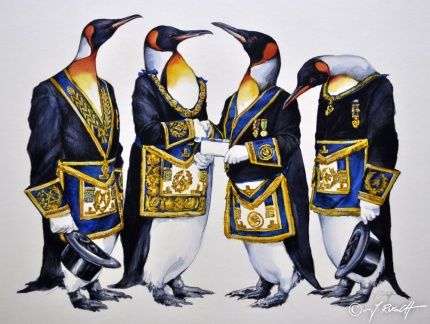
This step, while admittedly difficult for some, is firmly grounded in the Book of Constitutions, without question. Masonry has never intended the adoption of a progressive line. A progressive line should only function when the next man down has the full faith and trust of his fellows that he will rule and govern his Lodge properly, because he has properly learned the requirements of his office. Of course, human nature is what it is, and mistakes can always happen, but they can be mitigated if such a standard is put in place, because no one advances until and unless they are ready to do so. The only way to justify a progressive line is if every officer is carrying his weight to the extent of his office, while at the same time preparing himself diligently to advance to the next one. Lodges ignore this step at their own risk.
5
Dressing Your Best for Lodge
How one appears before the Lodge is a sign of how much you value both the brethren and the Craft. In most lodges in the world, a dark suit and tie is the minimum required to gain admittance. It’s what the brethren expect from each other in an observant Lodge, and it certainly adds to the notion that a Masonic meeting is not just another night out, but a special event, worthy of being 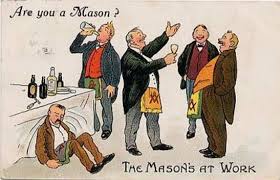 considered as special as each of us should believe Masonry to be. Additionally, dignity expressed outwardly through dress, serves as a superstructure, helping to enhance that dignity that can only be created from within.
considered as special as each of us should believe Masonry to be. Additionally, dignity expressed outwardly through dress, serves as a superstructure, helping to enhance that dignity that can only be created from within.
6
A Lodge Must Offer Quality Assemblies and Be Willing to Pay For Them
The dues of a Lodge should be set at a level which allows the Lodge to not only support and sustain itself, but enjoy a quality of experience which tells the brethren that their assemblies are opportunities to rise above the ordinary. Good meals, served at proper festive boards, are essential. The festive board conveys the sense of conviviality that helps build true brotherhood, and it is historically established in the Craft as not merely a simple dinner, but quite honestly the second half of a Lodge meeting. An observant Lodge cannot forego it.A Lodge must decide that Masonry is a thing of value, and properly determine that value in such a way that it allows the Lodge to work and assemble in a manner that clearly establishes that value. Our dining and social events should reflect the worth we place on ourselves. Excess is not the objective; quality is. The problem is that so many of us have forgotten what quality is to the extent that we consider any expenditure on ourselves to be pretentious. But if Masons are to be men of inner distinction, then we are fully justified in treating ourselves to the best we can afford in life. We cannot expect less from the Craft or ourselves.
7
The Return of a Sense of Awe to Our Ceremonies
We should bring back those things that once were found in our lodges, and which helped create a very unique, contemplative atmosphere for both the candidate and the Lodge. Among these are the use of music, the manipulation of light and darkness, the Chamber of Reflection, and the closing charge which forms what is known as the Chain of Union. Consider that the candidate preparation room is not and was never meant to be a mere dressing room. Consider that the notion of a ‘sacred band of brothers’ might allude to a physical manifestation of that sacredness. Consider that music has always been a part of our ceremonies, and that the Book of Constitutions ends with a collection of songs. All these things are part of who we are; they are not innovations from later jurisdictions or borrowings from European Masonry. Even the use of incense is ritually alluded to in early exposures of the Craft. The idea is to stimulate and manage the sensory experience of the brethren, in the endeavour to create the sense of uniqueness one expects from a Masonic experience. Here again, there is nothing strange about employing the senses in a Masonic meeting. Our rituals teach the importance of each of those senses extensively; to not employ them in our meetings is the greater neglect and error. To refuse the restoration of awe to our rituals is to refuse to acknowledge our own heritage and history, and to deny the proper place and application of the pillar of Beauty to the Lodge.
8
Masonic Education at Every Meeting
The very origin of Freemasonry itself is in education. Whether it be the practical education in stone-cutting found in the operative craft of masonry, or the search for inner knowledge and science presented to us by the speculative Craft, the foundation of the art is inexorably based in teaching and learning. Without it, there is simply no Freemasonry taking place in a Lodge. Therefore, every meeting of the Lodge should offer some amount of Masonic education, be it through the degrees, or through presentations on the various lessons of the Craft. Even a ten-minute talk focused on the symbolic meaning of a single working tool is far better than a meeting where nothing but donations, dinners, and dues are on the agenda. An observant Lodge values the educational function of Freemasonry in its full bloom; the observant Mason holds the fraternity accountable to its promise to him to bestow light, and he means to receive it from the Craft in every sense: spiritual, literal, and intellectual. Numerous monitors and manuals from our Grand Lodges, spanning over at least the last two centuries, make plain the injunction to all Masons to seek knowledge. That same injunction extends by natural progression to each Lodge, and as a result, a Lodge without Masonic education cannot be an observant Lodge, and is arguably not any kind of Lodge at all. The search for more light is at the heart of Masonry. Observance is impossible without it.
A note from the Editor: I entirely agree with WB Andrew Hammer. The social aspect alone of modern-days Freemasonry is pushed forward at every opportunity. It is an act of opportunism aimed at bumping up numbers within the Order.Brethren who are not happy in their Lodge, who feel disappointed with Freemasonry and want out, must not give up or despair. The cable tow that was placed around their neck at initiation does not symbolically tie them up to a particular Lodge or Brethren, only to the Craft. If they actively seek, they will find a Masonic Lodge that will not merely entertain them but truly impart masonic teaching onto them. Aldo Reno .'.
© 2011 - Andrew Hammer,PM of Alba Lodge 222 - This document may be freely distributed, with proper attribution.
Source and original title: Eight Steps to Excellence - The Observant Lodge
- His Majesty’s Servant , David Garrick Esq – Freemason ? - June 7, 2024
- Influencia de la Masonería en Chile - April 29, 2024
- Pomegranate in Freemasonry – its significance - March 11, 2024

